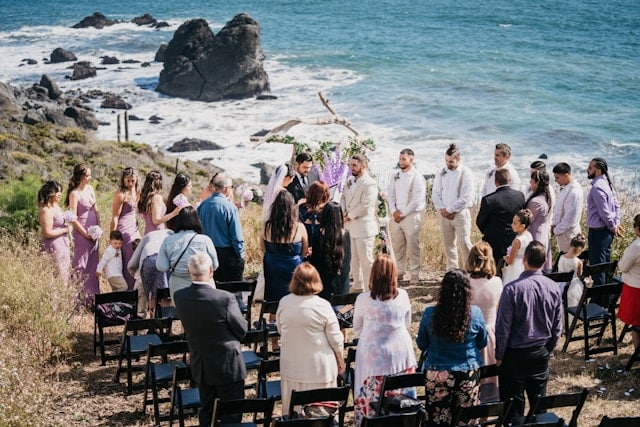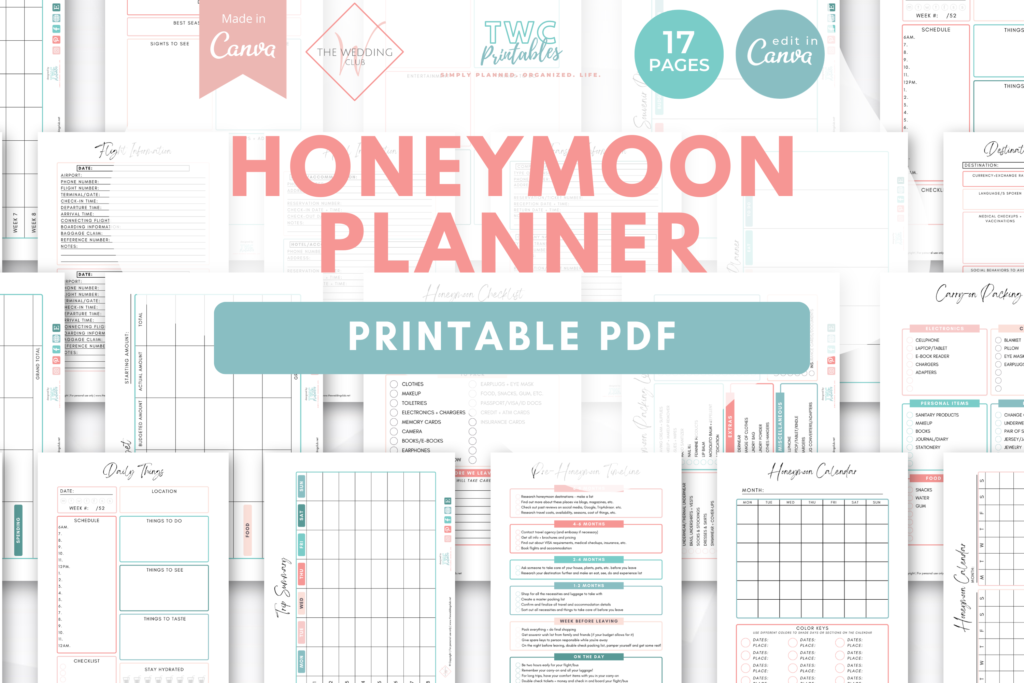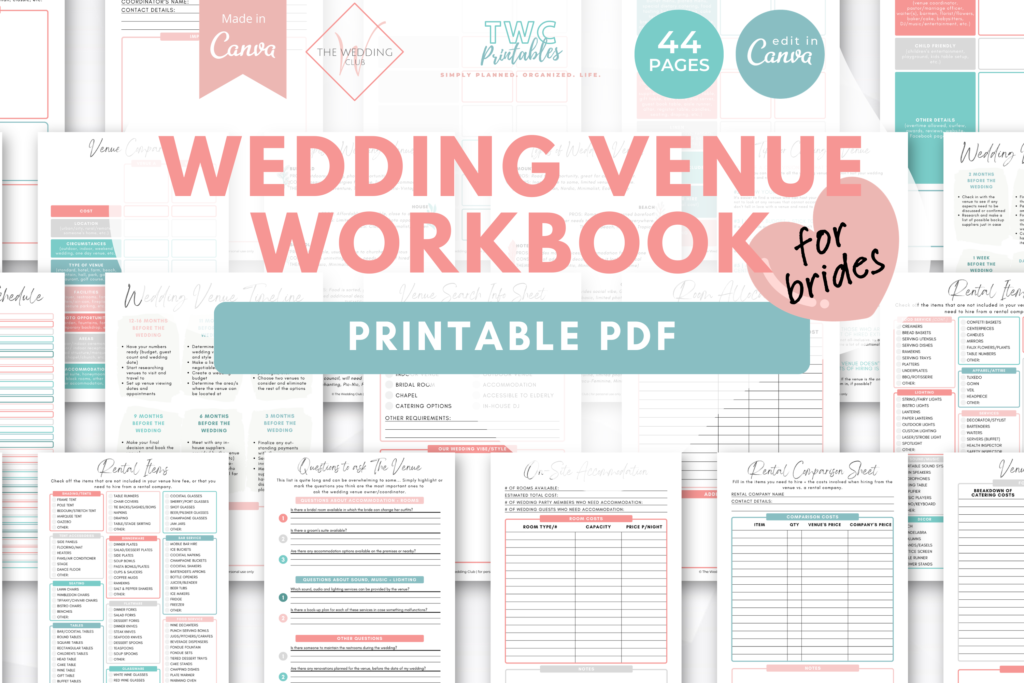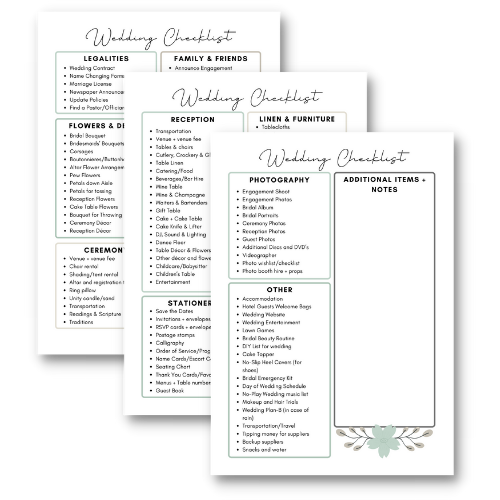Crafting the perfect wedding guest list is a pivotal task in planning your big day. In this comprehensive guide, we’ll walk you through the essential steps and considerations to ensure your guest list reflects your vision while staying within your budget and venue constraints.
From prioritizing loved ones to managing plus ones, seating arrangements, and more, discover expert tips and tricks for curating a memorable and stress-free guest list for your dream wedding.
Mastering the Art of Wedding Guest Lists: A Step-by-Step Guide
One of the most challenging and emotional tasks of planning your wedding is figuring out your guest list.
And, even if you did have an unlimited budget and can afford inviting everyone and their pet to your wedding, do you really want to do that?
Besides, you probably want to surround yourself with loved ones who will be there on your big day to witness your marriage.
But where to start?
It’s not as easy as taking all your phone contacts and inviting them, or going through your Facebook friends or Gmail contacts. And then there’s the factor of who your parents get to invite, and so on…
So, we have created this informative post to answer all your wedding guest list questions, plus help you to set one up!

5 Steps to create a wedding guest list
Step 1: Determine your budget and research some costs
As with most wedding planning steps, the budget is key. Your wedding guests are where most of your wedding budget will go.
You need to feed them, pay for their chair and table seating, invitations, wedding favors, etc. The list goes on…
And as things are getting pricier each year, you should know what the basic costs per person are, on average. What is deemed affordable, and what does a luxury venue charge per person?
Once you are clued up on per-person-costs, what type of venue you can get for that per-person price, etc., you can start making informed decisions and start working on your wedding budget.
After all, your wedding budget will determine what you can afford, and when and where you should cut costs.
Step 2: Choose a ballpark figure that you can tweak later on
If you already have an idea of the kind of wedding you want, you can easily decide on a set number of guests.
On average, weddings are normally between 100-150 guests, and anything above that will be seen as a large wedding.
Anyways, having a figure will help you to get the necessary quotes for your wedding, and help you to compare your wedding suppliers as well as choose which prices and services fit right in your budget.
Step 3: Gather lists from parents and keep them on hand
When choosing wedding guests, it’s not just about who you, as a couple, would like to invite. Normally, the parents of both the bride and groom also have a say on who they would like to invite.
And even more so if the bride’s parents are paying for the wedding. Then, traditionally, they would get first pick on who gets invited.
However, there are other ways to include wedding guests that’ll make everyone happy. See number 5.
Step 4: Research your wedding venue + size
If you already have a wedding venue and it’s pretty much booked and all set for the big day, then you have a clear figure to work with when building your list.
However, suppose you’re still trying to find the perfect wedding venue. In that case, you need to take into account how many people they can host (capacity), the cost per person (this is normally an all-inclusive price), accommodation costs if applicable, and also the season in which your wedding will take place at the venue (this will affect costs).
Also take note of any extras you will need at the venue, and which additional services they provide as well, such as a DJ, or in-house photographer, perhaps.

Step 5: Create the list, revise and finalize
Finally, your budget is set, you have an idea of what things cost, and how many guests your ideal wedding venue can cater to, and hopefully, you have also received lists from your parents, if applicable.
Now you can start creating the list, and edit as you go along.
You can use Google Sheets for this step, as it is easily shareable to those who need to access it, regularly updates as you type and edit, and, essential: backed up in your Gmail account/Drive! Plus it can be accessed from anywhere, which is handy when you’re meeting a supplier and quickly need to whip out the list.
Wedding Guest List Etiquette: The Dos and Don'ts...
Crafting your wedding guest list involves more than simply jotting down names; it requires a delicate balance of etiquette and consideration. Here are some essential guidelines to help you navigate this process smoothly:
When prioritizing your guest list, focus on those who hold significant importance in your life…
Immediate family members, close friends, and individuals who have played a pivotal role in your journey as a couple should be at the top of your list. By prioritizing these relationships, you ensure that your wedding day is filled with the warmth and presence of those closest to you.
However, it’s important to remember that you’re not obligated to invite everyone you know. Space and budget constraints may necessitate making difficult decisions about who receives an invitation.
Be selective, and don’t hesitate to exclude distant relatives or acquaintances if necessary. Your wedding day should be an intimate celebration shared with those who truly matter to you.
When extending invitations, consider plus ones thoughtfully…
While it’s customary to offer plus ones to married or long-term committed couples, you may choose to limit plus ones for single guests to manage guest count and expenses effectively. Communicate your decision clearly on the invitation to avoid any confusion or misunderstandings.
Effective communication is key throughout the wedding planning process, including managing your guest list…
Clearly convey important details such as RSVP deadlines, dress codes, and any specific instructions for guests. Provide multiple channels for guests to respond, accommodating their preferences and making it easier for them to confirm their attendance.
Navigating sensitive situations with grace and tact is essential when compiling your guest list…
Whether it’s divorced parents, estranged family members, or friends with complicated relationships, approach these scenarios with empathy and diplomacy. Strive to find a solution that respects everyone involved while prioritizing your own comfort and happiness.
By adhering to these etiquette guidelines, you can navigate the complexities of creating your wedding guest list with confidence and grace, ensuring that your celebration is filled with the people who matter most to you.

creating a wedding guest list that fits your budget...
Crafting a wedding guest list that aligns with your budget requires careful consideration and strategic planning. Here are some savvy tips to help you manage your guest list expenses without sacrificing the quality of your celebration.
When prioritizing guests for your wedding, focus on quality over quantity…
Instead of feeling pressured to invite every acquaintance or distant relative, prioritize those who have played a significant role in your life and relationship.
By narrowing down your guest list to include only your closest family and friends, you can reduce expenses associated with catering, venue size, and other accommodations.
Consider alternative venues or formats for your wedding celebration…
Hosting an intimate gathering at a smaller venue, such as a backyard or local restaurant, can significantly lower costs compared to a traditional banquet hall or hotel venue. Alternatively, consider options such as a brunch or cocktail-style reception, which typically require less space and resources.
Limiting plus ones is another effective way to control guest list expenses…
While it’s customary to offer plus ones to married or long-term committed couples, you may choose to restrict plus ones for single guests to conserve space and resources. Clearly communicate your decision on the invitation to avoid any confusion or misunderstandings.
Take advantage of digital RSVP platforms to streamline the RSVP process and reduce paper and postage costs.
Online RSVP platforms allow guests to respond conveniently from their smartphones or computers, eliminating the need for traditional RSVP cards and postage. Additionally, digital platforms often provide features for managing guest lists, tracking responses, and communicating updates to guests efficiently.
Consider creative ways to trim your guest list without sacrificing meaningful connections.
For example, instead of inviting coworkers or acquaintances, focus on inviting close family members, friends, and individuals who have had a significant impact on your life. By prioritizing quality relationships over quantity, you can create a more intimate and memorable celebration within your budget.
By implementing these budget-friendly tips, you can create a wedding guest list that reflects your vision while staying within your financial means.
Remember that the most important aspect of your wedding day is celebrating with the people who matter most to you, regardless of the size of your guest list.
using Interactive Tools and Templates to manage your guest list...
Managing your wedding guest list effectively requires organization and attention to detail. Utilizing interactive tools and templates can streamline the process, making it easier to track RSVPs, manage seating arrangements, and communicate with guests. Here are some valuable resources to help you simplify guest list management:
Online RSVP platforms offer a convenient way for guests to respond to your invitation digitally…
These platforms allow guests to confirm their attendance, select meal preferences, and provide additional information such as dietary restrictions or song requests. By using an online RSVP platform, you can track responses in real-time, making it easier to finalize your guest list and seating arrangements.
Seating chart templates (like the ones included in the Wedding Planner Bundle) provide a visual representation of your reception layout, allowing you to assign seats and tables for your guests…
These templates come in various formats, including customizable spreadsheets and interactive tools that allow you to drag and drop guests into their assigned seats.
By using a seating chart template (like the ones included in the Wedding Planner Bundle), you can create a well-organized seating plan that maximizes space and fosters an enjoyable dining experience for your guests.
Guest list management spreadsheets are essential for keeping track of important details such as guest names, addresses, RSVP status, and meal preferences…
These customizable spreadsheets allow you to organize your guest list efficiently, making it easy to update information and communicate with guests as needed.
Many templates also include features for categorizing guests by relationship, group, or invitation status, helping you stay organized throughout the planning process.
Communication tools such as email templates and messaging platforms allow you to communicate important information to your guests effectively…
Whether you’re sending out save-the-dates, reminders about RSVP deadlines, or updates about the wedding day itinerary, having pre-designed templates and automated messaging systems can save you time and ensure that your guests receive timely and accurate information.
By utilizing these interactive tools and templates, you can streamline the management of your wedding guest list and ensure that your celebration runs smoothly.
Whether you’re tracking RSVPs, organizing seating arrangements, or communicating with guests, these resources provide valuable support throughout the planning process, allowing you to focus on creating a memorable and enjoyable experience for everyone involved.
Family dynamics and your wedding guest list...
Managing family dynamics can be one of the most challenging aspects of creating your wedding guest list.
Whether it’s divorced parents, stepfamilies, or estranged relatives, navigating these relationships requires sensitivity and diplomacy. Here are some strategies to help you create a guest list that reflects your vision while maintaining harmony among family members:
Start by having open and honest conversations with your partner and family members about your guest list priorities and preferences…
Discuss any potential challenges or sensitive situations that may arise and work together to find mutually agreeable solutions. By establishing clear communication from the outset, you can minimize misunderstandings and conflicts down the line.
When it comes to divorced or separated parents, consider their comfort levels and preferences when extending invitations…
In some cases, it may be appropriate to invite both parents and their respective partners, while in other situations, separate invitations may be more suitable.
Be mindful of any tensions or sensitivities that may exist and strive to accommodate everyone’s needs as much as possible.
Addressing stepfamily dynamics requires careful consideration and sensitivity…
While it’s important to include stepparents and stepsiblings who have meaningful relationships with you and your partner, be mindful of any potential conflicts or discomfort that may arise.
Consider seating arrangements and other logistics to ensure that everyone feels included and respected on your wedding day.
When it comes to estranged relatives or family members with strained relationships, it’s essential to prioritize your own well-being and comfort…
While it’s natural to want to mend fences and reconcile differences, your wedding day may not be the appropriate time or place for such efforts. Trust your instincts and make decisions that align with your values and priorities, even if it means excluding certain individuals from your guest list.
Ultimately, creating a harmonious wedding guest list requires empathy, flexibility, and compromise.
By approaching family dynamics with sensitivity and understanding, you can navigate potential challenges and conflicts with grace and diplomacy, ensuring that your wedding day is a celebration of love and unity for everyone involved.

Destination Wedding Guest Lists...
Hosting a destination wedding adds an extra layer of complexity to managing your guest list. With guests traveling from afar to celebrate with you, it’s essential to consider their needs and accommodations carefully.
Here are some strategies to help you create a guest list that accommodates your destination wedding:
Start by considering the logistics of your chosen destination, including travel options, accommodations, and local attractions…
Choose a location that offers a range of lodging options to suit different budgets and preferences, from luxury resorts to boutique hotels and vacation rentals. Providing guests with a variety of accommodation choices ensures that everyone can find suitable lodging for their stay.
When compiling your guest list, be mindful of the additional expenses associated with attending a destination wedding, such as airfare, accommodations, and transportation…
Consider the financial implications for your guests and be understanding if some are unable to attend due to budget constraints or other obligations. Avoid putting pressure on guests to attend and respect their decisions, whatever they may be.
Communicate important information about your destination wedding early and clearly to your guests…
Provide details about travel arrangements, accommodations, and local attractions to help guests plan their trip effectively.
Consider creating a dedicated wedding website or informational packet with all the relevant information, including travel tips, recommended activities, and a packing list.
Consider hosting pre- or post-wedding events to make the most of your destination wedding experience and spend quality time with your guests…
From welcome parties to group excursions and farewell brunches, these additional events provide opportunities for guests to bond and create lasting memories together. Be sure to include these events in your guest list planning and budgeting.
Be prepared to accommodate guests who may have special needs or requirements, such as dietary restrictions, mobility issues, or childcare arrangements…
Work closely with your venue and vendors to ensure that all guests are well taken care of and have a comfortable and enjoyable experience throughout the wedding festivities.
By considering these factors and planning ahead, you can create a guest list that accommodates your destination wedding and ensures that all guests feel welcome and appreciated.
With careful preparation and communication, your destination wedding can be a memorable and unforgettable experience for everyone involved.
Honoring Cultural and Religious Traditions in Your Wedding Guest List
Whether you’re incorporating customs from your own heritage or embracing those of your partner’s culture, here are some key considerations to keep in mind:
Start by discussing with your partner and families which cultural and religious traditions you wish to incorporate into your wedding celebration…
Whether it’s a traditional ceremony, cultural rituals, or religious blessings, understanding and respecting each other’s traditions is essential to creating a meaningful and inclusive experience for all.
When compiling your guest list, consider the customs and expectations of your cultural or religious community…
This may include inviting extended family members, close friends, and community elders who hold special significance within your cultural or religious circle. Be mindful of any customary practices regarding invitation etiquette and seating arrangements.
Be prepared to accommodate diverse dietary preferences and restrictions among your guests…
Whether it’s kosher, halal, vegetarian, or vegan options, ensure that your menu offerings reflect the dietary needs of your guests and align with any cultural or religious requirements.
Communicate with your caterer and venue to make appropriate arrangements for meal options and food preparation.
Consider the timing and scheduling of your wedding festivities to accommodate cultural or religious observances and holidays…
Avoid scheduling your wedding on dates that conflict with significant religious holidays or observances, and be sensitive to the needs of guests who may be observing fasting periods or other religious practices.
When sending out invitations, consider incorporating elements of your cultural or religious heritage into the design and wording…
This may include traditional symbols, blessings, or greetings that hold special meaning for you and your families. Personalizing your invitations in this way adds a touch of authenticity and significance to your wedding celebration.
By honoring cultural and religious traditions in your wedding guest list, you create a sense of inclusivity and connection that resonates with your heritage and values.
Whether you’re blending different cultural backgrounds or embracing a shared tradition, prioritizing these customs enriches the overall experience for you, your guests, and your families.

Managing Last-Minute Changes to your Guest List
In the midst of wedding planning, unforeseen circumstances may necessitate last-minute adjustments to your guest list.
Whether it’s unexpected declines, late RSVPs, or changes in venue capacity, navigating these changes requires flexibility and quick thinking. Here are some strategies to help you manage last-minute adjustments effectively:
Stay organized and keep track of all RSVPs and guest list details in a centralized location…
This could be a spreadsheet, wedding planning app, or online platform where you can easily update information and communicate with your vendors and venue. Having a clear overview of your guest list allows you to identify any gaps or discrepancies and address them promptly.
Communicate with your venue and vendors to assess the feasibility of accommodating any last-minute changes to your guest list…
Depending on your venue’s capacity and layout, they may be able to accommodate additional guests or make adjustments to seating arrangements to accommodate changes in attendance.
Be proactive in reaching out and discussing your options as soon as possible.
Consider implementing a waitlist or backup plan for guests who may be added to your guest list at the last minute…
This could involve securing additional seating or making arrangements for overflow areas in case of unexpected increases in attendance. Having a contingency plan in place helps mitigate stress and ensures that all guests are accommodated comfortably.
Be prepared to handle unexpected declines or cancellations gracefully…
While it’s disappointing to receive RSVPs indicating that guests are unable to attend, it’s important to respond with understanding and empathy.
Reach out to these guests to express your regrets and thank them for their response, and consider sending them a keepsake or token of appreciation to acknowledge their thoughtfulness.
Keep lines of communication open with your guests throughout the planning process, especially as the wedding date approaches…
Send out reminders about RSVP deadlines, provide updates on any changes to the itinerary or logistics, and be accessible to answer any questions or concerns that may arise.
Clear and timely communication helps ensure that all guests feel informed and valued as part of your celebration.
By staying organized, proactive, and communicative, you can navigate last-minute adjustments to your wedding guest list with confidence and ease.
Whether it’s accommodating changes in attendance or addressing unexpected challenges, approaching these situations with flexibility and grace ensures that your wedding day is a memorable and enjoyable experience for everyone involved.
Adapting Your Wedding Guest List for Virtual Attendance
With the rise of virtual wedding options, couples are finding creative ways to include guests who are unable to attend in person.
Whether it’s due to travel restrictions, health concerns, or other commitments, virtual attendance offers a way for loved ones to participate in your celebration from afar.
Here’s how to adapt your wedding guest list to accommodate virtual guests:
Start by identifying which guests may be unable to attend in person and would benefit from virtual attendance options…
This could include elderly relatives, friends from out of town, or anyone facing travel restrictions or health concerns.
Reach out to these guests to gauge their interest in participating virtually and discuss how they can be included in your celebration.
Choose a platform that suits your needs and preferences for hosting remote guests…
Whether it’s a video conferencing app, live streaming service, or virtual reality platform, select a platform that offers the features and functionality you need to connect with your virtual guests and share your wedding day festivities with them in real time.
Communicate with your virtual guests in advance to provide them with the necessary information and instructions for accessing the virtual event…
This may include sharing login credentials, providing technical support resources, and outlining any special activities or moments they can expect to participate in remotely.
Make sure to test the virtual setup beforehand to ensure a seamless experience for all guests.
Consider incorporating interactive elements into your virtual wedding to engage remote guests and make them feel more connected to the celebration…
This could include virtual toasts, interactive games or polls, and opportunities for remote guests to send well wishes or messages of congratulations in real time. By involving virtual guests in the festivities, you create a sense of inclusion and unity that transcends physical distance.
Be mindful of the logistics and technical considerations involved in hosting a virtual wedding, such as internet connectivity, audiovisual equipment, and bandwidth requirements…
Be mindful of the logistics and technical considerations involved in hosting a virtual wedding, such as internet connectivity, audiovisual equipment, and bandwidth requirements.
By adapting your wedding guest list to include virtual attendance options, you can ensure that all guests feel included and valued as part of your celebration, regardless of their physical location.
Embracing virtual wedding options allows you to connect with loved ones near and far, creating a truly memorable and inclusive experience for everyone involved.
Addressing Common Questions and Concerns
As you navigate the process of creating your wedding guest list, you may encounter various questions and concerns from both yourselves and your guests.
Here are some common FAQs about wedding guest lists and how to address them:
Determine your guest list priorities by considering immediate family members, close friends, and individuals who have played a significant role in your lives.
Be selective and focus on inviting those who you genuinely want to share your special day with.
While it's natural to want to include everyone, space and budget constraints may require you to make difficult decisions about who receives an invitation. Be mindful of your limitations and prioritize quality over quantity.
Consider offering plus ones to married or long-term committed couples, but be selective about extending this invitation to single guests to manage guest count and expenses effectively. Clearly communicate your plus one policy on the invitation to avoid any misunderstandings.
Follow up with guests who haven't RSVP'd by the deadline to confirm their attendance. Be prepared to make adjustments to your seating arrangements and catering numbers based on late responses or unexpected declines.
Use seating chart templates or interactive tools to organize your seating arrangements efficiently. Consider factors such as guest relationships, dynamics, and preferences when assigning seats, and be prepared to make adjustments as needed.
Approach sensitive family dynamics with empathy and diplomacy, and prioritize your own well-being and comfort. Be honest with yourselves about which relationships you want to include in your celebration and make decisions that align with your values and priorities.
It's entirely up to you whether to invite children to your wedding. If you decide on an adults-only celebration, clearly communicate this on the invitation and consider providing childcare options for guests with young children.
Respond graciously to declines or cancellations and express your understanding to guests who are unable to attend. Consider sending them a thank-you note or keepsake to acknowledge their response and appreciation for being a part of your celebration.
By addressing these common FAQs about wedding guest lists, you can navigate the planning process with confidence and ease, ensuring that your guest list reflects your vision for your special day.
Remember to communicate openly with your guests and be flexible in accommodating their needs and preferences as you finalize your guest list.

by Tanya Guilfoyle
Born in Johannesburg, South Africa, Tanya has been an active contributor and planner in the wedding industry since 2016. When not writing useful content for brides and wedding professionals, she can be found designing templates for her Etsy shop, TWCprintables.









